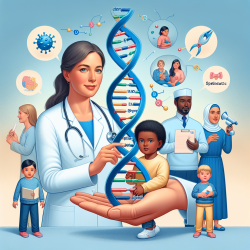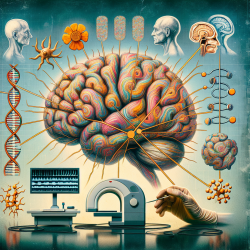Introduction
In the realm of speech-language pathology, understanding the genetic underpinnings of developmental disorders can significantly enhance therapeutic outcomes. The recent study, "A second cohort of CHD3 patients expands the molecular mechanisms known to cause Snijders Blok-Campeau syndrome," provides pivotal insights into the genetic basis of this rare neurodevelopmental disorder. This research expands our understanding of the CHD3 gene's role, offering valuable data that can refine diagnostic and therapeutic approaches for practitioners working with affected children.
Key Findings from the Research
The study analyzed 24 new patients with CHD3 variants, including nine with variants outside the ATPase/helicase domain. Notably, the research found no significant phenotypic differences between patients with variants inside or outside this domain. This suggests that a broader range of genetic disruptions can lead to Snijders Blok-Campeau syndrome, characterized by intellectual disability, developmental delay, particularly in speech, and distinct facial features.
For speech-language pathologists, these findings underscore the importance of considering genetic testing in cases of unexplained speech delays and developmental disorders. Understanding the genetic basis can guide more personalized and effective intervention strategies.
Implications for Practice
Integrating genetic insights into speech-language pathology practice can enhance the precision of assessments and interventions. Here are some practical steps practitioners can take:
- Advocate for Genetic Testing: Encourage families and healthcare teams to consider genetic testing for children with unexplained developmental delays, particularly when speech is affected.
- Collaborate with Geneticists: Work closely with geneticists to interpret genetic findings and integrate them into therapeutic planning.
- Customize Therapy Plans: Use genetic information to tailor therapy plans that address the specific needs and potential challenges associated with genetic disorders.
- Stay Informed: Keep abreast of the latest research in genetics and its implications for speech-language pathology to continually refine your practice.
Encouraging Further Research
The study highlights the need for ongoing research to further elucidate the genetic mechanisms underlying Snijders Blok-Campeau syndrome and similar disorders. Speech-language pathologists can contribute to this body of knowledge by:
- Participating in Research: Engage in collaborative research efforts to explore the speech and language profiles of children with genetic disorders.
- Documenting Clinical Observations: Systematically record and share clinical observations that may inform future research and enhance understanding of genetic influences on speech and language development.
Conclusion
The integration of genetic insights into speech-language pathology offers a promising avenue for improving outcomes for children with developmental disorders. By leveraging the findings from the CHD3 study, practitioners can enhance their diagnostic and therapeutic approaches, ultimately contributing to better long-term outcomes for children with Snijders Blok-Campeau syndrome and similar conditions.
To read the original research paper, please follow this link: A second cohort of CHD3 patients expands the molecular mechanisms known to cause Snijders Blok-Campeau syndrome.










